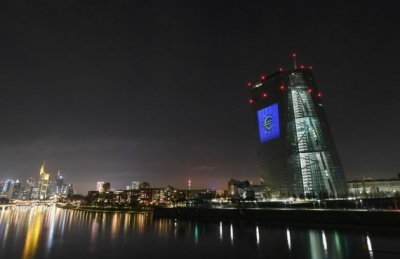 Frankfurt, Feb 3 (IANS) The European Central Bank (ECB) has increased interest rates by 50 basis points (bps) and sent out a dovish message about the outlook for future rate hikes.
Frankfurt, Feb 3 (IANS) The European Central Bank (ECB) has increased interest rates by 50 basis points (bps) and sent out a dovish message about the outlook for future rate hikes.
“In view of the underlying inflation pressures, the Governing Council intends to raise interest rates by another 50 basis points at its next monetary policy meeting in March and it will then evaluate the subsequent path of its monetary policy,” the bank said in a statement after a rate-setting meeting here.
The interest rates on the main re-financing operations and on the marginal lending facility and the deposit facility will be increased to 3 per cent, 3.25 per cent and 2.5 per cent, respectively, reports Xinhua news agency.
Speaking at a press conference after the meeting, ECB President Christine Lagarde said that price pressures remain strong as energy costs are spreading through the economy even if there are signs that inflation has been dropping.
She reiterated that the bank will stay the course in raising interest rates significantly at a steady pace.
However, the guidance given by the ECB about its future path of rate rises is a departure from its stance in December, when Lagarde said that the bank will continue hiking rates by 50 bps for a period of time.
Lagarde conceded on Thursday that the ECB’s tightened monetary policies have pushed borrowing costs higher.
According to her, bank lending to firms has decelerated sharply as the demand for loans to finance business investment has become weaker.
ING’s global head of macro, Carsten Brzeski, said the ECB was “opening the door to either a pause or a slower rate hike pace beyond March”, a view that was reflected in market moves as Germany’s 10-year yield fell 15 bps to 2.14 per cent.
Separately, the International Monetary Fund (IMF) urged central banks to “communicate the likely need to keep interest rates higher for longer”.
“Loosening prematurely could risk a sharp resurgence in inflation once activity rebounds, leaving countries susceptible to further shocks, which could de-anchor inflation expectations,” the head of the IMF’s Monetary and Capital Markets Department, Tobias Adrian, and his two deputies wrote in a blog post.
The tighter monetary policy is piling pressure on the economic growth of the 20-member eurozone.
According to the ECB’s December staff projection, economic activity has slowed markedly since mid-2022, and “we expect it to stay weak in the near term”.
–IANS
ksk/











